These two are kind of the most important cloud certifications in today’s world. One might wonder,“What’s the difference? I can just go for any of them!”
But there are, in fact, a few important differences that you might not be aware of.
In this blog, we are going to talk about those particular differences in detail.
As the world slowly moves towards the cloud platform more and more every day, the number of cloud certifications is increasing. Among them,CCSK and CCSPare the certifications cloud professionals are more likely to go for.
Reason? Of course, there is abetter pay package and tons of job opportunities.
So, what do these certifications offer exactly? Let’s have a closer look at that.
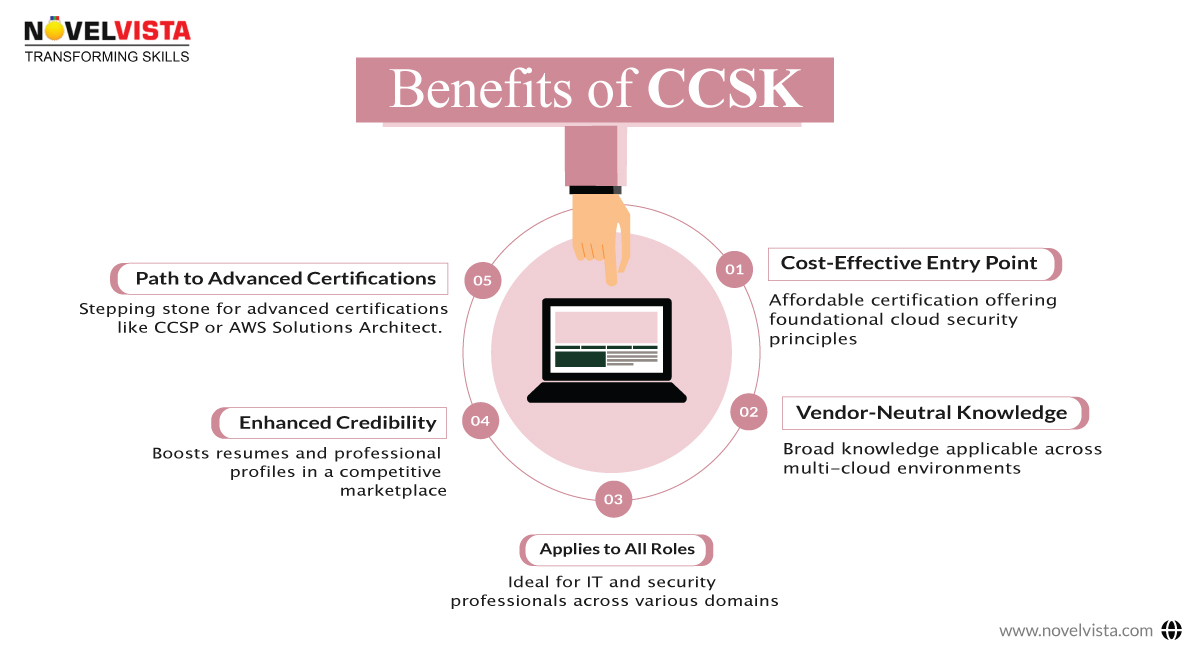
CCSK is relatively affordable, providing foundational cloud security principles. It is, therefore, the best certification for an individual or organization that may have budgetary constraints but would like to build a good understanding of cloud security.
One of the strengths of CCSK is that it provides vendor-neutral knowledge on general cloud security best practices that apply across platforms. This gives the practitioner a broad application for his/her knowledge and makes him/her a better asset in multi-cloud provider organizations.
It will indicate that one has a high level of professional concern to understand cloud security basics. It adds to the credibility of resumes and professional profiles, enhancing one's competencies in an increasingly competitive marketplace.
Many take CCSK as a stepping stone to more advanced certifications such as CCSP or those specific to a cloud platform, such as AWS Certified Solutions Architect.
The wide range of CCSK makes it worth the investment for any IT and security professional, from technical support to compliance auditing. It lays a strong foundation for those seeking further specialization in specific domains.
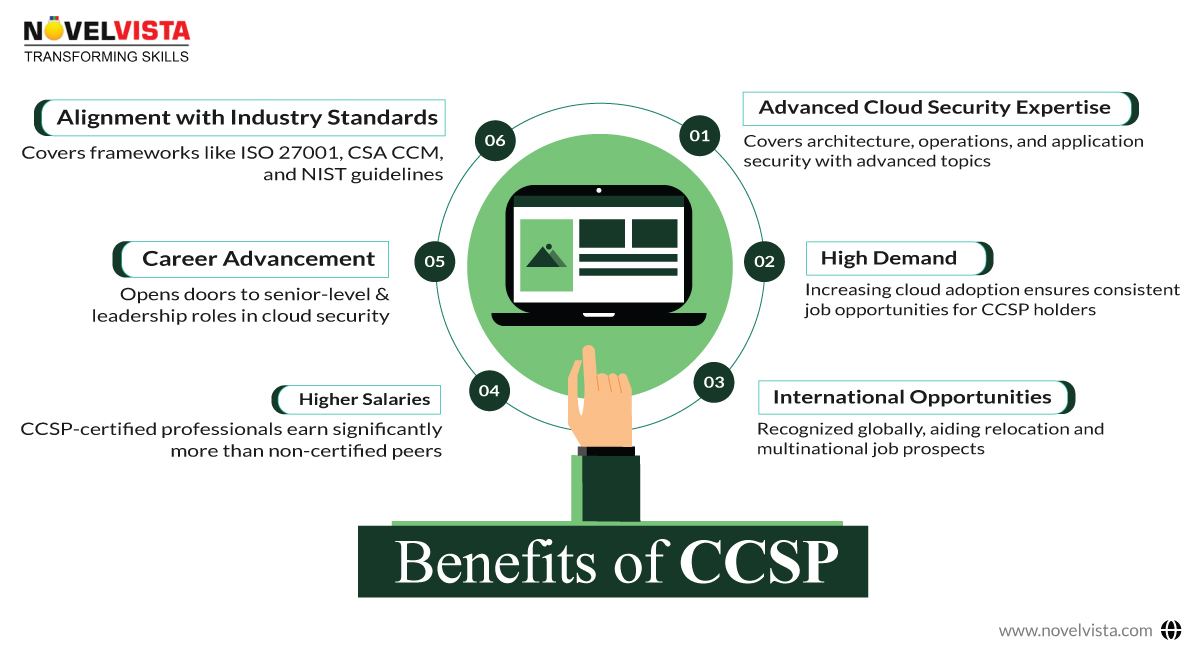
CCSP certifies expertise in cloud security architecture, operations, and application security. It includes advanced topics such as identity and access management, data protection, and cloud application security.
With the spread of cloud adoption, people are looking out for CCSP-qualified professionals to secure their infrastructures. The demand thus ensures smooth and continuous prospects for jobs everywhere.
Being (ISC)²-certified makes it an internationally recognized certification by all means; therefore, increasing job opportunities through multinational organizations abroad is also made easy. Additionally, it aids the relocation opportunities for professionals into such organizations with foreign locations.
CCSP holders often command higher salaries due to their specialized expertise. According to industry surveys, CCSP-certified professionals earn significantly more than their non-certified peers.
It opens doors to senior-level positions inCybersecurityand cloud security management. CCSP certification is often a prerequisite for leadership roles in cloud security.
CCSP is aligned with critical frameworks such as ISO 27001, CSA's CCM, and NIST guidelines. This alignment ensures that certified professionals are well-versed in the latest industry standards and best practices.
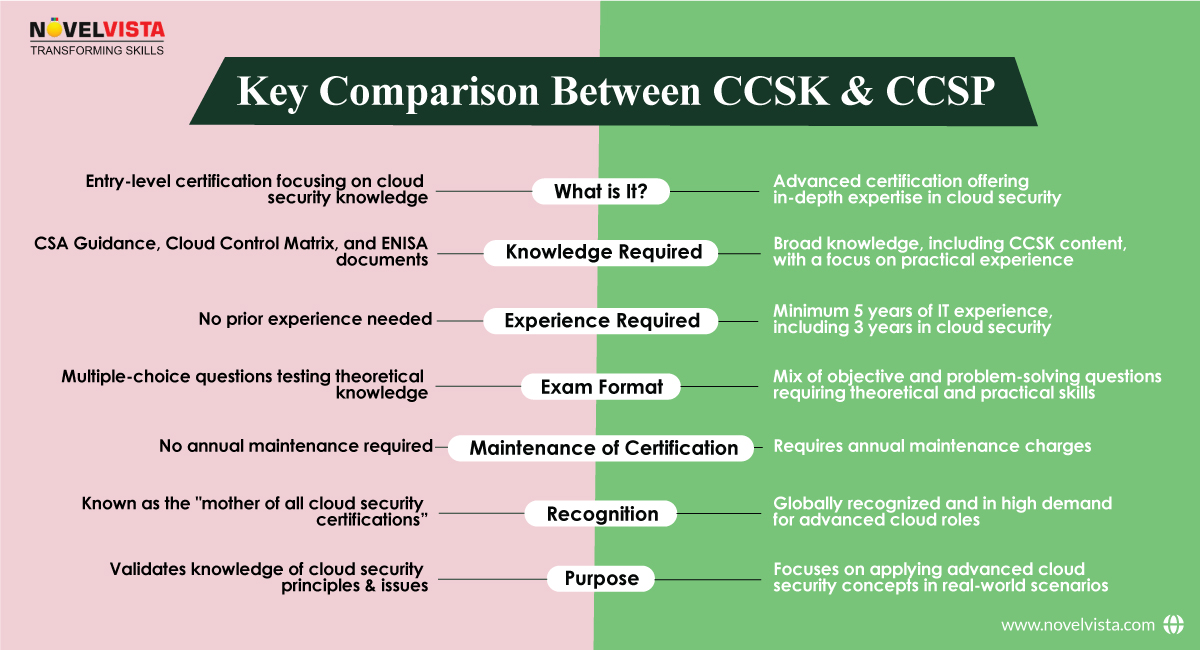
CCSK is the abbreviation for a Certificate of Cloud Security Knowledge. Recently,CIO magazinehas coined CCSK as the“mother of all cloud computing security certifications.” The reason behind it is that CCSK certification helps professionals upgrade themselves with entry-level to medium-range cloud security knowledge. Also, this certification mainly focuses on validating an individual’s knowledge regarding cloud security issues.CCSK training helps you gain deep insights into cloud security and related aspects while delivering a far-reaching understanding of how to address various cloud security concerns.
To go for CCSK, one must be well equipped with knowledge on:
Being an entry-level certification, CCSK does not require any prior experience. Everything one requires to get past this certification is to finish a target-type test with great information in the as-of-now referenced two key documents.
CCSK is focused on testing information and follows the arrangement of the objective test which has multiple-choice answers.
CCSK doesn’t have any hard-and-fast rules or annual charges to maintain the certification.
So that was pretty much everything about CCSK. Now, let’s talk about CCSP. Shall we?
CCSP or Certified Cloud Security Professionalwas introduced byCloud Security Alliance (CSA) and ISC2in 2015. This certification challenges the information and the handy experience of the applicants. Hence, CCSP offers inside-out proficient ideas in the area of Cloud Security. It has a worldwide acknowledgment, and like CCSK, experts with CCSP are in incredible interest. And the funny thing? Due to the comparative area of Cloud Security, we at times consider CCSP and CCSK as competitive certifications; however, the truth of the matter is that they complement one another.
CCSP certification requires a wide range of knowledge, along with the above-mentioned documents. The exam syllabus for this certification, too, is based on practical experience.
CCSP just permits experts with 5 years of involvement with the area. In the specific expressions of CCSP, the experience required is "least of 5 years of full-time, paid, combined data innovation, including, at any rate, 3 years of cloud security and 1 year of cloud computing."
To pass the CCSP exam, one requires both theoretical and practical knowledge. Hence, the certification exam’s questions contain both objective and problem-solving questions.
CCSP certification has its annual maintenance charges.
Now, let’s look at the differences between CCSK and CCSP certification at one glance:
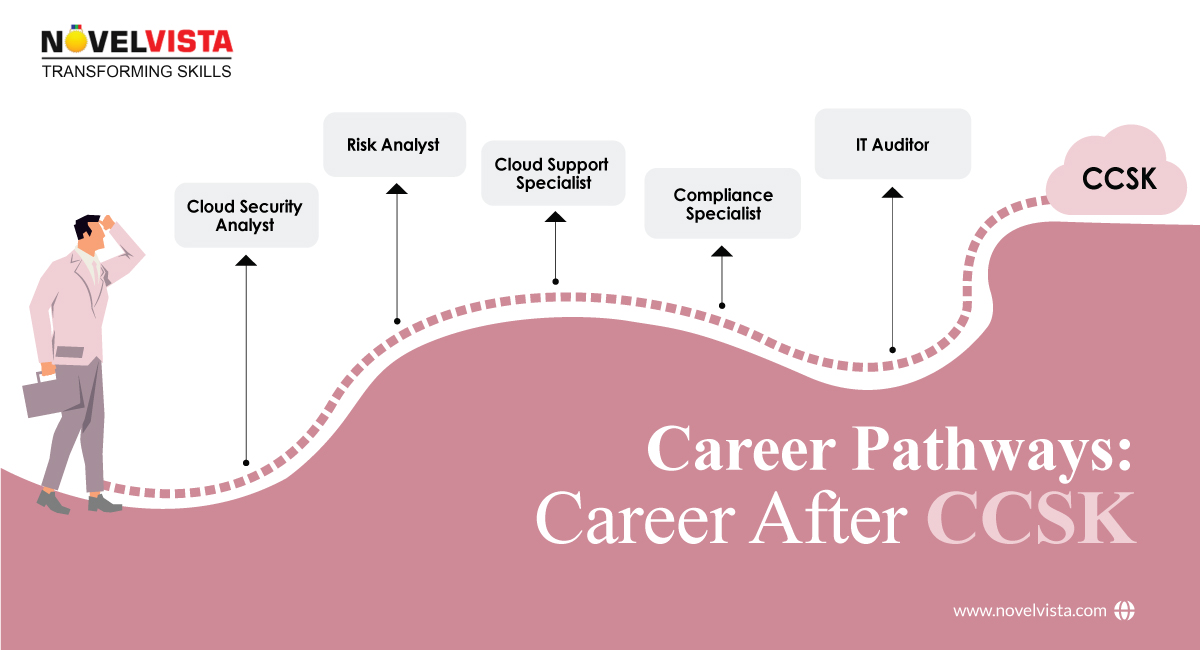
Certificate of Cloud Security Knowledge (CCSK) is an entry-level certification in cloud security principles, best practices, and risk management. It is widely recognised as an essential credential for IT professionals who want to specialise in cloud security. Here are some career pathways for individuals holding aCCSK certification training course:
A Cloud Security Analyst determines the security state of the cloud environment and identifies security vulnerabilities. At CCSK, professionals acquire this knowledge to conduct assessments of cloud architecture for threat detection with solutions and proposals for improving security aspects. This type of job requires someone who takes pleasure in using data and working with trends towards mitigating risks.
Many cloud engineers start with CCSK to understand unique security challenges related to platforms such as AWS, Azure, and Google Cloud. Having integrated knowledge of cloud security expertise, they go on to design and deploy cloud-based systems safely. Much of this role calls for cross-functional collaboration concerning security standard compliance.
CCSK-certified professionals are organizations' go-to people to ensure that their cloud infrastructure complies with the regulations of GDPR, HIPAA, and PCI DSS. Compliance specialists, with their understanding of cloud-specific compliance frameworks, conduct audits, draft policies, and guide teams to maintain regulatory standards.
A Risk Analyst identifies and mitigates risks associated with cloud adoption and management. CCSK equips professionals with a set of tools and frameworks they require to conduct effective evaluations regarding cloud risks. The analysts sometimes are pivotal while conducting strategic planning and disaster recovery initiatives.
CCSK Certified IT Auditors examine the cloud environments' security posture and help ensure that best practices are adopted by organizations. They prepare very detailed reports, outlining actionable improvement measures to be implemented for stronger security and compliance.
CCSK certification helps prepare professionals to assume roles dealing with the technical support of cloud-based systems. They help troubleshoot security issues provide guidance to end-users and ensure smooth operation of the clouds.
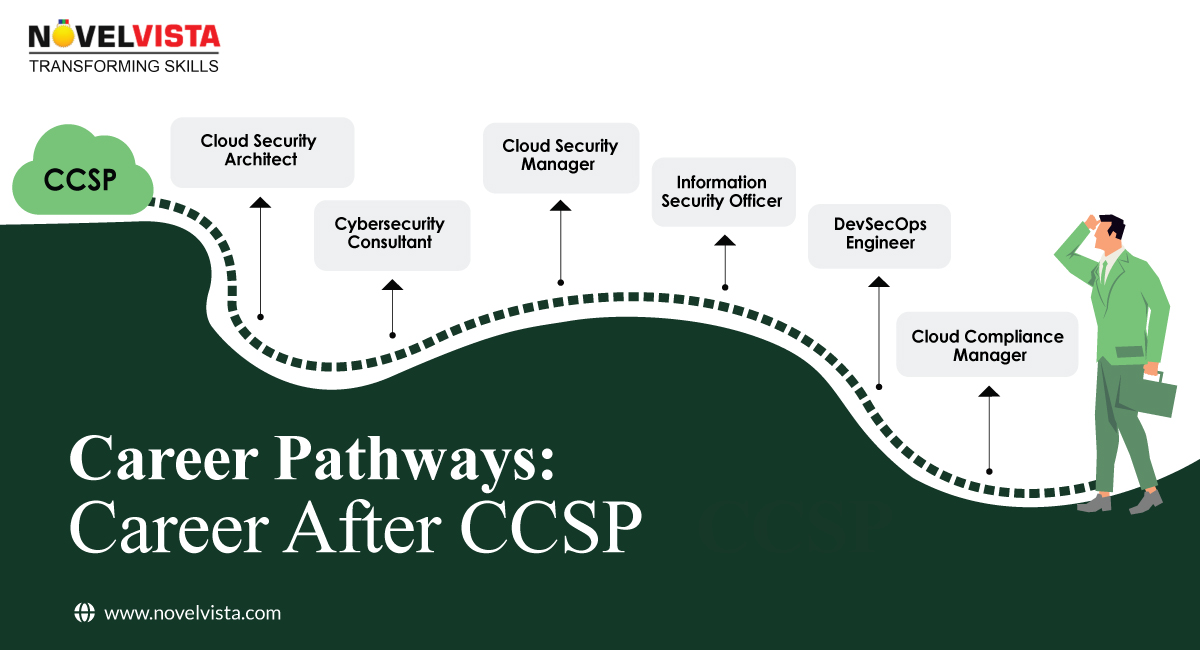
The Certified Cloud Security Professional, provided by (ISC)², is an advanced certification that ensures deep expertise in cloud security. It is well-suited for experienced professionals seeking higher-level roles in security and IT leadership. Some of the notable career options include:
CCSP-certified professionals design and implement secure cloud systems, ensuring the protection of data and infrastructure. They create security blueprints, establish secure application workflows, and ensure that cloud environments meet organizational and regulatory requirements. This role often involves collaborating with stakeholders to align security goals with business objectives.
Organizations look for CCSPs to fill advisory positions where they offer advice on how to secure complex cloud environments. As a consultant, they analyze where improvements lie, define strategies for improvement, and guide businesses through cloud migration in the most secure manner possible.
With CCSP, professionals can manage security teams dedicated to protecting cloud-based assets and operations. Cloud Security Managers oversee daily security operations, manage incidents, and lead the implementation of long-term security strategies. They often coordinate with other departments to ensure seamless security practices.
The CCSP prepares professionals for leadership roles in the development of cloud security policies and strategies. Information Security Officers will ensure that the organizational data and applications are secured by industry standards. In most of these roles,cloud incident responserequires communication skills to be able to bridge technical teams with executive management.
CCSPs are important contributors to the integration of security practices in cloud-based DevOps pipelines. They ensure that applications are both functional and secure from potential threats by embedding security throughout the development lifecycle. It requires knowledge of automation tools and cloud security principles.
These CCSP-certified professionals focus on ensuring an organization's cloud operations adhere to global standards and frameworks. These professionals stay up to date on evolving regulations, conduct compliance audits, and train teams on best practices.
Official CSA guidelines are a source of information to understand the core topics that come under the CCSK exam. These documents run from cloud architecture todata securitycontrols, thus building a comprehensive knowledge base.
This document by the European Union Agency for Cybersecurity outlines risks and recommendations for securing cloud environments. It is very useful for professionals who handle risk management.
A basic reference for cloud security controls across different types of cloud environments. The CCM is a required reference for anyone looking to prepare for the CCSK exam and apply cloud security principles in real-world scenarios.
From CSA, this guide covers all the subjects in detail and helps with your preparation for the examination. It includes explanations, examples, and tips for passing the examination.
Self-testing online with practice exams and quizzes designed with the syllabus of CCSK is good for assessing personal abilities. These assist candidates in checking their weaker sections and thus their test-taking ability.
Platforms available likeNovelVistaprovide training and offer formal study courses related to all subjects from the CCSP exam.
Authored by experts, this guide covers all six domains of the CCSP CBK. It provides comprehensive explanations, case studies, and practice questions for thorough preparation.
Practice tests will familiarize the candidates with the question pattern and weak areas. The practice test is also designed to closely mirror the real test environment.
Resources such as the CSA CCM and STAR certification are beneficial in understanding cloud security. These materials supplement the CCSP study guides, thereby offering an all-rounded view of cloud security.
This is an excellent way of online training to learn in depth by a student at his or her convenience. The content is interactive and covers videos, and quizzes to further lock in essential ideas.
One can find a lot of online courses on CCSP through NovelVista. Most of these online courses include video lectures, quizzes, and other study materials designed by industry experts to match up well with the CCSP curriculum.
We can’t really draw a conclusion aboutwhich one is better: CCSK or CCSP. CCSK and CCSP both have their ownadvantages and disadvantages.
Now comes the ultimate question:which one should you choose?
The coverage of CCSP is quite good too, but if you are planning on going for only one cloud security certification, you should choose CCSK.
Why? Because it is 100% focused on cloud security and architectural patterns and also contains knowledge of cloud-specific technologies.
Thinking of going for your CCSK training? You can check out ourCCSK training and certification course’s curriculum, and if that suits you, enroll yourself right away!
Confused about our certifications?
Let Our Advisor Guide You